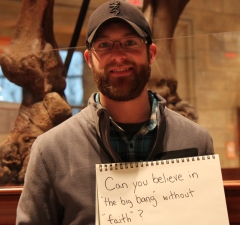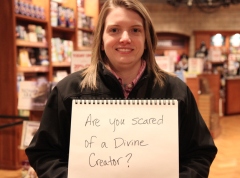 On the “Basics” page, we briefly addressed Pascal’s Wager as an argument for belief: today, we want to go a little further into this often-used apologetic.
On the “Basics” page, we briefly addressed Pascal’s Wager as an argument for belief: today, we want to go a little further into this often-used apologetic.
To recap: Blaise Pascal (1623-1662) was a seventeenth-century French scientist, mathematician, and philosopher. Educated by his father, Pascal was intellectually versatile from a young age: he invented a mechanical calculating machine, performed experiments that clarified our understanding of pressures and vacuums, and in mathematics, made theoretical discoveries that led to the development of calculus and of probability theory. It was possibly the latter that led to his development of this argument, in which Pascal tries to explain, in terms of probability, why we should believe that God exists. As expressed in his posthumously published philosophical work, the Pensées (III, §233), it goes something like this:
-
We cannot determine by reason whether a God exists or does not exist.
-
God either is, or is not: there is no third option, like a game in which the outcome is either heads (God exists) or tails (God does not exist).
-
You must play this game. It is not optional. By existing, every person bets their life on the possibility of God’s existence or non-existence.
-
What are the possible outcomes of this game?
-
You choose to believe in God.
-
If God exists, you win, and the gain is infinite (eternal reward).
-
If God does not exist, you lose nothing (no reward).
-
You choose not to believe in God.
-
If God exists, you lose, and the loss is infinite (eternal punishment).
-
If God does not exist, you lose nothing (no eternal punishment).
-
Therefore, believing in God is the better choice, since the possible gain is infinite (eternal life, eternal happiness), and the possible loss is negligible. Not believing in God is the worse choice, since the possible gain is negligible, and the possible loss is infinite (eternal punishment).
Objections
Pascal’s Wager is not a proof of God’s existence. This is the weakest objection to the wager, since Pascal says from the get-go that one cannot determine the existence of God by using reason, and instead argues for belief in God’s existence. Pascal’s Wager is not a metaphysical argument, but a pragmatic argument.
Which god is the correct one to believe in? Or, as Homer Simpson once put it: “What if we picked the wrong religion? Every week we’re just making God madder and madder!”
Pascal’s Wager offers no help in determining which of the thousands of gods believed in and worshiped by humanity is the correct god to believe in (which we will refer to as OTG or “one true God”), although as a Catholic, Pascal believed in the three-in-one god (Father, Son, Holy Spirit) of Catholic Christianity, and appears to be urging us to believe likewise.
Elsewhere in the Pensées, Pascal attempts to compare and contrast the concepts of God held by various peoples, such as the polytheist gods of pagan antiquity and the Allah revered in Islam, and deals with most of them pretty briskly, judging them inferior to the concept of God as elaborated by Catholic Christianity, as not in accordance with reason or as superstition. However, he does not appear to consider the rituals of Catholicism to be superstition, such as for instance the doctrine of transubstantiation, in which bread and wine are considered to be the literal body and blood of Christ during the ritual of communion. Nor does he consider it irrational to consider that a perfect, all-powerful, all-knowing god creates humanity with sin (or alternately, creates humanity knowing it will become sinful) and appeases their collective guilt by creating a human incarnation of himself who dies, offering a blood sacrifice which washes away the sin.
Ultimately, it is confirmation bias (that is, the tendency to see things that confirm an already established point of view) that leads Pascal to champion Catholic Christianity as the religion most free of superstition and most in accord with reason, and to regard its god as OTG, and as he does not consider the possibility of OTG having a nature and attributes which are not described by established theological doctrine, leads to a false dichotomy: either there is an OTG that rewards belief and punishes non-belief, or there is no OTG at all.
Even if OTG may exist, the possible outcomes of Pascal’s Wager depend on the existence of a soul and an afterlife, which may not exist. Pascal assumes here that if you accept the existence of OTG, you accept the whole enchilada, including the existence of a soul which passes from physical existence in this world to an eternal existence in heaven or hell. But the co-existence of OTG, souls, and an afterlife are not necessarily dependent on each other. There may be an OTG, but no souls or afterlife, or conversely, there may exist souls and an afterlife, but no OTG. Souls may not pass from the physical plane to an afterlife, but instead reincarnate after death. Other permutations are possible. The existence of OTG, of eternal souls, and of an afterlife, are in fact three different inquiries.
Even if I find Pascal’s Wager a compelling argument for belief, I cannot simply “choose” to believe, or as Pascal himself puts it, speaking for a hypothetical non-believer, “I am so made that I cannot believe. What would you have me do?” Pascal, again, anticipates this objection, and offers the following: if the Wager is valid, then non-belief is irrational, and your inability to believe comes from your emotions, or “passions” as he puts it. If this is the case, then his advice is, essentially, to “fake it till you make it”: go through the motions, until you find yourself believing. And he seems to think that if you truly try this, you will end up believing, sooner or later.
The idea that non-belief is irrational and that “pretending” to believe by going through the motions will eventually result in genuine and sincere belief is related to modern apologists who assert that atheists “just want to sin” or do not wish to believe that they will be judged by God, and who prescribe prayer to atheists, promising that if they pray hard enough, they will eventually have a subjective experience that will be adequate to validate a belief in God. But this does not explain the experience of former believers (and most atheists are former believers) who, in the past, sincerely believed in their god and prayed desperately for the resolution of their doubts, only to find that the promised resolution never happened.
It is also interesting that Pascal phrases this objection the way he does: “I am so made that I cannot believe,” since it raises the possibility that non-believers are made on purpose, presumably by OTG, not to believe, which opens up a new line of questions as to what that purpose might be, and eventually, questions as to the nature of OTG himself. If OTG made me a non-believer, there must be a purpose that he made me so, and who am I to question that purpose?
Would an all-powerful, infinite, perfect OTG really care whether his creation believes in his existence? Pascal’s Wager assumes that OTG demands belief from his creation, and will reward or punish his creation as they believe or disbelieve. But when God is defined, as most theologians did who laid down the principles of the faith to which Pascal subscribed, as perfect in every way, to also say that God demands belief and worship is a contradiction: a perfect being would have no deficiencies, that is to say, no “needs” that must be satisfied by an outside entity; therefore a perfect being would not need belief or worship. And other sorts of god are also conceivable. God might be a divine creator or first-cause, creating the universe, and therefore, the conditions that lead to sentient life, but remain indifferent to, or even unaware of, the affairs of human beings. This was, of course, the position of Deists, who, rather than look to revelation and to religious authority for answers to questions of morality, ethics, meaning and purpose, looked instead to reason. This would change the possible outcomes of Pascal’s Wager profoundly. Not only would there be no infinite loss to the non-believer if such a god existed, there could also conceivably be no infinite gain to the believer.
Why would OTG prefer a human scared of eternal punishment over one who values and seeks after truth? We have considered the possibility that OTG demands belief from his creation, and also the possibility that OTG is indifferent to whether his creation believes in him or not. There is yet another possibility, that OTG cares about intellectual honesty and integrity over unquestioning acceptance of received wisdom, even if such honesty and integrity leads to the created being being skeptical of the existence of its own creator. Such a god may welcome independence of thought and action and consider this a measure of success in his creation, like a teacher who mentors a student into developing his intellectual capacities, or a parent who sees his or her offspring take on an independent role in their own lives.
Are the costs of belief in OTG as trivial as Pascal says they are? Pascal asserts that one has nothing to lose by opting for belief. But there may be much to lose, depending on which version of OTG one chooses to believe in. Belief in a god, particularly the god that Pascal believes in, does not usually entail saying, “Okay, I believe,” and then going on with your life: it also involves a lifelong commitment in thought, word, and deed. It may involve forgoing certain pleasant experiences, such as sex, food, and intoxicants, all of which can be considered harmful if indulged in excessively, but may enhance one’s happiness if enjoyed moderately and with good sense. It may involve regular religious duties such as prayer and worship, confession of and penance for one’s sins. Ir may involve tithing, that is, giving a certain percentage of one’s income to the church. It may involve surrendering one’s independence of thought to the accepted doctrines of one’s religion.
Pascal says that the long-term gains of belief outweigh the short-term losses:
“Now, what harm will befall you in taking this side? You will be faithful, honest, humble, grateful, generous, a sincere friend, truthful. Certainly you will not have those poisonous pleasures, glory and luxury; but will you not have others? I will tell you that you will thereby gain in this life, and that at each step you take on this road, you will see so great certainty of gain, so much nothingness in what you risk, that you will at last recognise that you have wagered for something certain and infinite, for which you have given nothing.”
Pascal is arguing that, at the very least, belief will make you a better person. But the virtues he lists here—honesty, humility, generosity, truthfulness, sincerity, etc.—can be shown by atheists as much as by believers, and the fact that the atheist is virtuous without expectation of a reward may even be considered more honorable than a believer who is virtuous in order to be rewarded. But as we have considered the personal losses of pleasure and intellectual independence, we must also consider the possible negative social consequences of religious belief. As we noted elsewhere on the Basics page, misogyny, homophobia, slavery, racial and ethnic hatreds, social inequality, extremist violence, suppression of scientific and intellectual inquiry, brutal and cruel methods of justice, sectarian violence, have been and can be justified using religious dogma and religious thinking. Pascal himself says elsewhere in the Pensées that “Men never do evil so completely and cheerfully as when they do it from religious conviction” (XIV, §894).
But this supporting passage in the wager not only assumes that belief in any case makes anyone a better person, but beginning at “I will tell you…,” Pascal appeals to personal testimony and implicit trust in the apologist, much as proselytizers today will say, “Since I gave my heart to the Lord, I have never been happier, and if you do as I did, you will be happier too.” Appeals to personal testimony do not confirm or deny anything; they only refer to a subjective experience that cannot be examined or evaluated by others. Many believers have subjective experiences that are sufficiently convincing to them to justify their beliefs to themselves, but these are of less value in overcoming the skepticism of other persons.
Differing views of hell and the afterlife. In the Old Testament, the words that were later translated by Christians as “hell” had no connotation of either being a spiritual afterlife or a place of eternal punishment. The Hebrew sheol can be translated variously as “pit”, “grave”, “abyss”, or “hiding place”, and its use in the Old Testament cannot be construed as meaning anything like “hell” as it is understood today. Alternately, the word Gehenna referred to the valley (or ravine) of Hinnom, which was a place where the corpses of executed criminals, apostates, and other miscreants were burnt: certainly a place considered unholy, but an actual place on earth nevertheless. It is to this place that Jesus refers in his sermons. Having been written in Greek, the New Testament also refers to places and concepts borrowed from Greek culture and mythology such as Hades (where all mortals went after death, named after the god of the dead) and Tartarus (where particularly evil mortals were punished). It is not until long after the writing of the New Testament, in the early years of the formation of the Christian church, that the concept of hell, borrowing from pagan and classical mythology, begins to be formed into doctrine.
And concepts of hell and the afterlife continue to differ in the modern age, with some theologians defending the view that hell is spiritual annihilation, in which the sinner’s soul simply ceases to exist and the saved are the ones who enjoy an eternal afterlife, and others supporting the idea of hell as simply being eternal separation from God, rather than a domain where people are literally tortured for eternity.
Pascal’s Wager relies on the certainty that the statement “Hell is a place of eternal punishment, and persons who do not believe in OTG will certainly find themselves there after death” is true, but with the continuing differences of opinion as mentioned above, it is far from certain that this is indeed the case.
Reward and punishment schedule is fixed, and OTG will not renege on the wager or change its terms. Pascal’s Wager depends on the certainty that OTG will, in all cases, honor the terms of the wager and reward believers and punish non-believers, but this is far from certain. The twentieth-century French philosopher Étienne Souriau points this out with a parable of a fool watching a leaf on the surface of a river that is momentarily halted by a rock in the water. The fool announces that he bets a million with Rothschild (that is, a rich man) that the leaf will pass on the left side of the rock rather than on the right. Eventually the leaf does pass on the left side and the fool says “I win the bet”, but unfortunately for him, Rothschild never said “I will take the bet.”
In other words, we can never know whether OTG will actually accept the terms of the wager and honor them. If we cannot resolve the question of OTG’s existence from reason, we certainly cannot propose the wager to OTG and have him audibly and unmistakably accept the bet, for if this were the case, we have proof of OTG’s existence and there is no need to bet at all.
Pascal’s Wager casts a long shadow in the history of Western religious and philosophical thought, justifying a more lengthy and less summary treatment than most apologetics. It came out of Pascal’s interest in probability theory, and was the first formal use in philosophy of decision theory. In the discipline of Christian apologetics it was particularly new, with its focus on “what should we do?” rather than “can God be proven to exist?”, linking it to the existentialist tradition in nineteenth and twentieth century philosophy, which encompassed both religious thinkers and writers like Kierkegaard and atheist ones like Sartre. Though it fails to convince most non-believers, it is still a component in most proselytizing offered by popular apologists. In Pascal’s text, it is also vigorously and dramatically expressed, and deserves more than a cursory glance.
The Pensées by Blaise Pascal is available at Project Gutenberg, available in HTML and plaintext format as well as in EPUB and Kindle formats.


 On the “Basics” page, we briefly addressed Pascal’s Wager as an argument for belief: today, we want to go a little further into this often-used apologetic.
On the “Basics” page, we briefly addressed Pascal’s Wager as an argument for belief: today, we want to go a little further into this often-used apologetic.
















 The US Supreme Court agreed on November 26 to hear arguments involving the “religious freedom” of businesses concerning coverage of certain forms of contraception under the Affordable Care Act (ACA), according to Robert Barnes at the
The US Supreme Court agreed on November 26 to hear arguments involving the “religious freedom” of businesses concerning coverage of certain forms of contraception under the Affordable Care Act (ACA), according to Robert Barnes at the 
